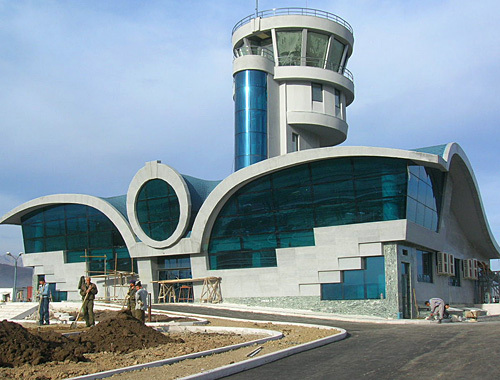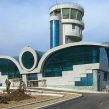
Launching of New Airport in Karabakh May Lead to Unpredictable Consequences
Publication: Eurasia Daily Monitor Volume: 9 Issue: 185
By:

During the second half of September 2012, several Armenian news agencies reported that Khojali Airport in Azerbaijan’s breakaway region of Karabakh was about to be reopened (news.am, September 26). The Khojali Airport near Khankendi (also called Stepanakert in Armenian) was built in 1974 and was intended to serve flights from Baku. Since the outbreak of war in 1992, the airport has remained shut down, but in 2008, the Armenian government began undertaking reconstruction efforts. The airport’s capacity is planned to serve around 100 passengers per hour. In December 2011, the Armenian media reported that Eduardo Ernekyan, an Argentine businessman of Armenian origin, donated the first plane to the Khankendi airport (Yerkramas, December 29, 2011). However, 10 months after the promise, there is still no sign of the plane (Zerkalo, October 4). The Armenian side intended to reopen the Khojali Airport on May 9, 2011, but postponed it for an uncertain period. Last year, when construction was completed, Armenia openly declared its intention to launch regular flights between Yerevan and Khankendi. Some public officials in Baku threatened to prevent such actions and even use the military to stop such flights. In response, Yerevan accused Baku of state terrorism while Armenian President Serzh Sargsyan promised to become the first passenger of the first plane flying from Yerevan to Khankendi (Asbarez.com, March 31, 2011).
The fresh news of the renewed possibility of flights between Yerevan and Khankendi again enraged Baku. Several public officials warned Armenia against escalating the situation in the region. “Azerbaijan has banned the use of the airspace of Nagorno-Karabakh occupied by Armenia, as no one can guarantee flight safety in the area” the head of the Azerbaijani Civil Aviation Administration, Arif Mammadov, stated (Trend.az, September 22). The spokesperson for Azerbaijan’s Ministry of Foreign Affairs, Elman Abdullayev, stated that opening an airport in the occupied territories of Azerbaijan is harming the negotiation process. Thus, the international community should express its opinion on Armenia’s attempts to torpedo the peace process. “Such provocative actions by the Armenian side show an absence of political will in Yerevan to solve the conflict and its intent to sustain the status-quo.” Moreover, such actions violate the Chicago Convention on International Civil Aviation and International Civil Aviation Organization (ICAO) rules (Zerkalo, October 6). Furthermore, Araz Azimov, the deputy foreign minister of Azerbaijan, stated that Khankendi’s airspace is Azerbaijan’s airspace, and the same principles of sovereignty are applied to it as to the territory on the ground. Azimov asserted that flights from any country over Azerbaijan’s territory are impossible without Baku’s permission. Azimov argued that Armenia’s attempts to present the reopening of Khojali Airport as a humanitarian action is illegal. “These territories are occupied, and the aggressor’s armed forces are stationed there. I believe that such air traffic [to and from the Khojali Airport] will be used primarily for supplying these armed forces. Of course, this is unacceptable,” he said (Trend.az, September 22).
Azerbaijani lawmakers were also extremely harsh in commenting on the possibility of reopening the airport in Khankendi. MP Igbal Agazade believes that the public should be involved in the discussion over this important issue. Another parliamentary member, Sabir Rustamkhanli, expressed his disappointment that the Azerbaijani public did not protest over the Armenian side’s actions (Vesti.az, October 5). “The Armenian side is bluffing. The airport in Khankendi is ready neither technically nor legally,” parliamentarian Aydin Mirzazade stated, on the other hand. “Today, Armenia cannot economically sustain one more airport beyond Yerevan. There is also the judicial side of the issue: the airport [must first] pass registration and receive a license from the International Civil Aviation Organization. Otherwise [arrivals and departures to and from Khojali] will be considered piracy and not civilian flights. Taking into consideration that Khankendi is on Azerbaijani territory, the appearance of an unidentified plane on the territory of Azerbaijan may thus be considered a violation of its air borders” (Echo, October 6).
Baku has also received support on this issue from its long-standing ally—Ankara has officially condemned the Armenian actions as well. The Turkish foreign ministry’s press office stated that continued occupation of Karabakh is the main obstacle for stability in the Caucasus. Thus, Turkey continues to support the territorial integrity of Azerbaijan and decisively condemns the illegal actions of Armenia (Zerkalo, October 6).
Some experts have openly expressed concern that the reopening of Khojali Airport may escalate the conflict between Armenia and Azerbaijan. Thomas de Waal, analyst at the Carnegie Foundation, believes that Azerbaijan will not risk actually shooting down civilian planes heading to or from Khankendi, fearing that such actions would arouse condemnation from the international community. However, de Waal did not exclude the possibility of raised tensions on the frontline (News.am, October 4). A number of Armenian experts have also criticized the sudden reopening of the airport. In particular, Vitaliy Balasanyan has noted, “There are enough rational people in Karabakh and Armenia to understand that the airport should first of all receive a license for operation and a special code from the ICAO” (News.am, October 4).
Undoubtedly, Armenian actions may endanger peace in the region. By unilaterally opening the airport in the Karabakh region, the Armenian side leaves no room for Azerbaijan to maneuver. Baku may be left with no options than to prevent such a scenario by any means. In such a case, the possibility of a new full-scale war between the two sides will become more real than before.




